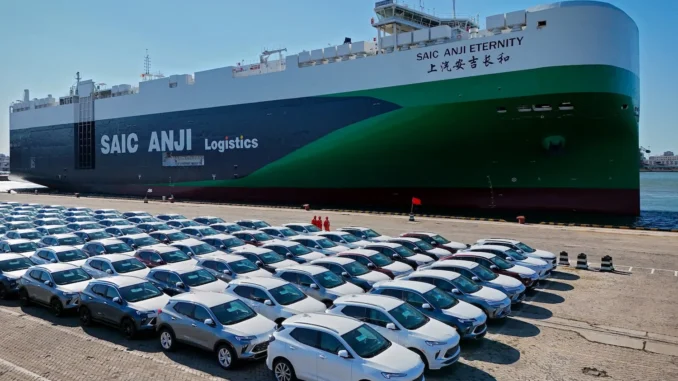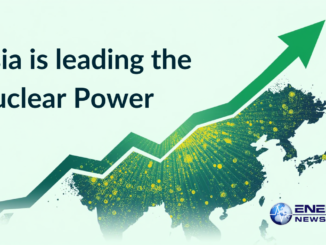
Rows of cars are lined up next to a large blue and green ship.
In Western markets, large SUV and pickup truck sales have hit new highs. “[I]f SUVs were a country, they would be the world’s fifth-largest emitter of CO2,” Patrick Schröder wrote this week. “By comparison, electric vehicles (EVs) … still only account for roughly one-tenth of total passenger car sales in the United States.”
Meanwhile, in China, sales have soared—and the country, which boasts the world’s largest EV market, exported its vehicles at unprecedented rates last year.
How did China come to dominate the global market? Why has Tesla, a U.S. company, underperformed this year? And what do U.S. and European tariffs on Chinese EVs mean for the green transition? This edition of Flash Points seeks to answer these questions and more on the geopolitics of EVs.
A car leaves a car carrier.
Electric vehicles of Chinese car manufacturer BYD leave the car carrier ship BYD Explorer No. 1 at the port of Bremerhaven, Germany, on Feb. 26. Focke Strangmann / AFP
China’s Global EV Domination Is Just Beginning
The West isn’t ready for it, FP’s Howard W. French writes.
A white Hummer limousine is parked by a palm tree.
A stretched Hummer limousine is advertised for sale Los Angeles on March 16, 2009. Mark Ralston/AFP/Getty Images
If SUVs Were a Country
Western governments are not confronting the threat they pose, Patrick Schröder writes.
A man stands next to a glowing electric vehicle charging station as he plugs in his car at night.
A driver charges his electric vehicle at a charging station in Monterey Park, California, on Aug. 31, 2022. Frederic J. Brown/AFP via Getty Images
Is Biden Deferring the Green Transition to Contain China?
Electric vehicle tariffs put geopolitics before climate change, Robert A. Manning writes.
Rows of cars are seen from above.
New electric cars for sale are seen parked at a distribution center of the Changan automobile company in southwestern China’s Chongqing municipality on March 24, 2024. AFP / China OUT
The Fight Over China’s Electric Cars Is Upside-Down
Paul Hockenos considers why Europe’s car companies are against—and environmentalists are for—making Chinese EVs more expensive.
Tesla vehicles stand outside of a Brooklyn showroom and service center in New York City.
Tesla vehicles stand outside of a Brooklyn showroom and service center in New York City, on Aug. 27, 2018.Spencer Platt/Getty Images
What’s Ailing Tesla?
FP’s Cameron Abadi and Adam Tooze discuss why more people are buying electric cars, just not from Elon Musk.






